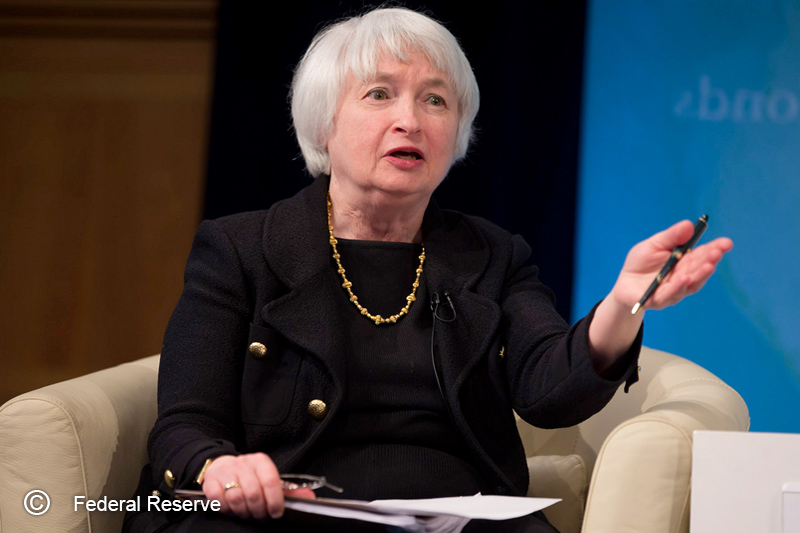By Michael Flaherty and Howard Schneider
WASHINGTON (Reuters) - Monetary policy faces "significant limitations" as a tool to counter financial stability risks, Federal Reserve Chair Janet Yellen said on Wednesday, adding that heading off the U.S. housing bubble with higher interest rates would have caused major economic damage.
Weighing in on a global debate, Yellen reiterated her view that regulation - not rate policy - needs to play the lead role in combating excessive financial risk-taking.
"The potential cost ... is likely to be too great to give financial stability risks a central role in monetary policy discussions," Yellen said at an event sponsored by the International Monetary Fund.
She didn't close the door entirely, however, and she cited some areas that bore monitoring with an eye toward a possible tightening of regulation.
Analysts said Yellen was pushing back against some Fed officials who believe financial stability should be given a more prominent place in formulating monetary policy.
Jeremy Stein, who stepped down as a Fed governor in May, had sparked the debate by arguing higher rates should at least be considered to help stamp out possible asset bubbles, and a number of regional Fed bank presidents have warned of the dangers of keeping rates near zero for too long.
But Yellen made clear she did not see a need for the U.S. central bank to alter its current course. "I do not presently see a need for monetary policy to deviate from a primary focus on attaining price stability and maximum employment," she said.
HAND-WRINGING
The U.S. stock and bond markets have soared on the back of the Fed's money-printing and near-zero rates, prompting warnings from some economists that new bubbles are forming. The IMF said last month a prolonged period of ultra-low U.S. rates - they have been near zero since late-2008 - had prompted a weakening in lending standards and risky behavior by investors.
For her part, Yellen pointed to unusually narrow corporate bond spreads, a lack of financial volatility and weak lending standards in the leveraged-loan market as areas of concern.
"It is critical for regulators to complete their efforts at implementing a macroprudential approach to enhance resilience within the financial system," she said.
Yellen said building a stronger system was all the more important because economies around the globe could be in need of historically low rates for some time to come, whether due to scars from the financial crisis or deeper underlying economic shifts.
Because of that, central banks could run out of room to cut rates more frequently when financial shocks hit, she warned.
Yellen cited a number of steps the United States had taken to strengthen its financial sector, including setting higher capital requirements for banks.
In making her case that regulation should be in the forefront of fighting financial stability risks, she harkened back to the mid-2000s, when U.S. housing prices were soaring.
Yellen argued a "very significant tightening" of monetary policy would have been needed to stop the housing bubble from building, and that the cost would have been a very large increase in unemployment.
(Reporting by Michael Flaherty and Howard Schneider; Additional reporting by Krista Hughes, Jonathan Spicer and Jason Lange; Editing by Paul Simao)
